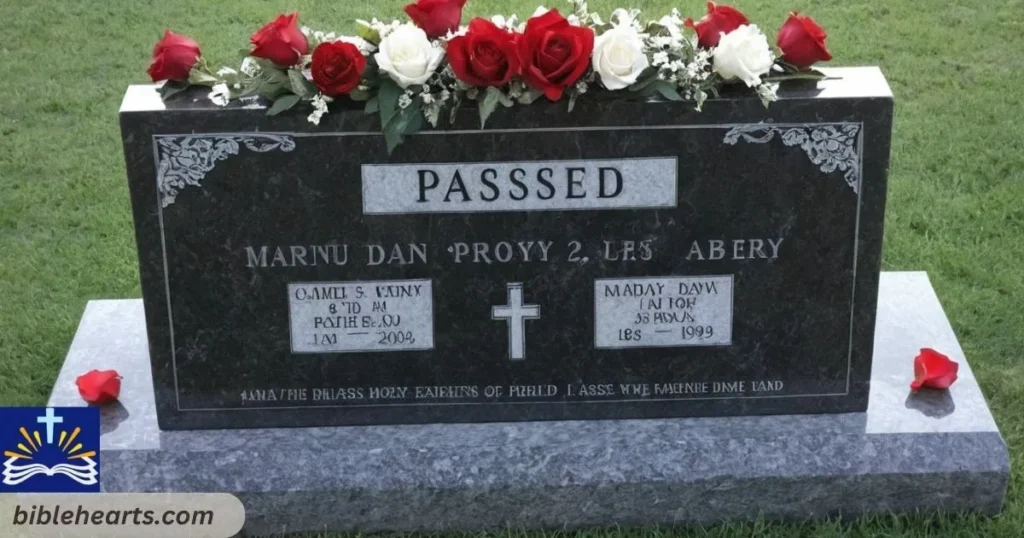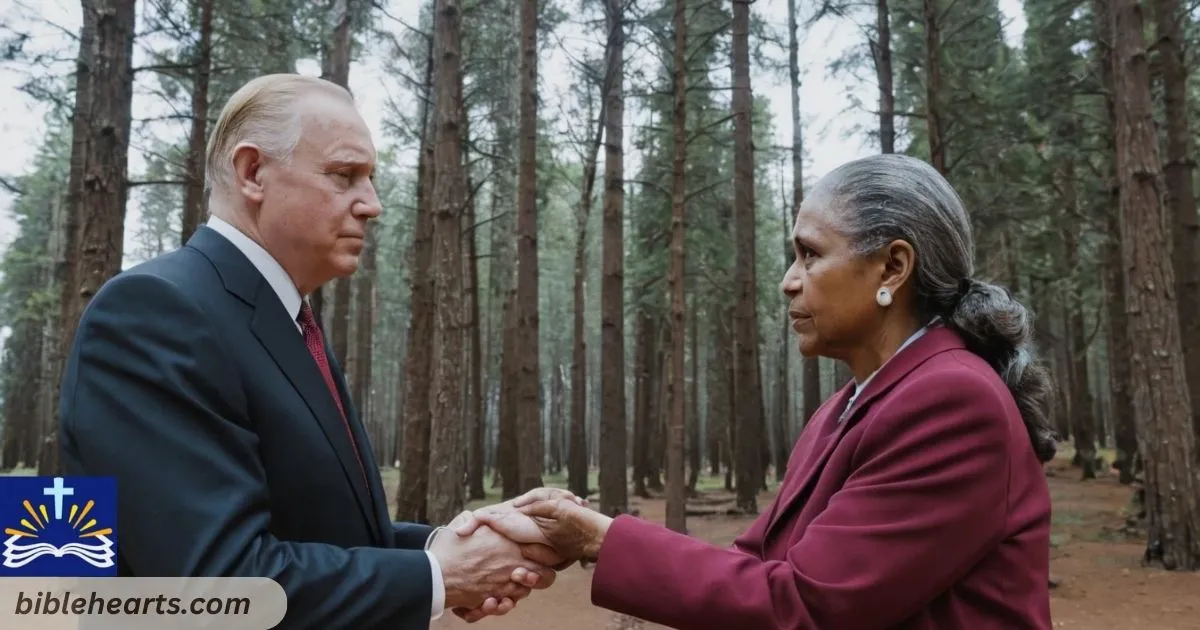“Harmony in relationships is not just a desire; it’s a divine calling rooted in forgiveness and love.”
Reconciliation is a vital aspect of human relationships, embodying the essence of forgiveness and understanding. Whether it’s with family, friends, or even acquaintances, seeking harmony can transform conflicts into opportunities for growth and deeper connections.
The Bible offers numerous insights into this sacred process, guiding us toward the healing power of reconciliation. In a world often characterized by division and discord, the messages found in Scripture can illuminate paths toward restoring broken relationships.
Many individuals struggle with the idea of forgiveness, grappling with feelings of hurt, betrayal, and anger. However, through biblical teachings, we can learn to overcome these obstacles and cultivate a spirit of reconciliation, fostering peace and unity in our lives.
This blog post will delve into 30+ Bible verses that speak to the theme of reconciliation. Each verse will be accompanied by real-life examples, showing how these teachings can manifest in everyday life. Furthermore, we will address common questions surrounding reconciliation, offering practical advice and spiritual wisdom.
1. The Call to Reconcile
- Matthew 5:23-24: “Therefore, if you are offering your gift at the altar and there remember that your brother or sister has something against you, leave your gift there in front of the altar. First, go and be reconciled to them; then come and offer your gift.”
- 2 Corinthians 5:18: “All this is from God, who reconciled us to himself through Christ and gave us the ministry of reconciliation.”
- Colossians 3:13: “Bear with each other and forgive one another if any of you has a grievance against someone. Forgive as the Lord forgave you.”
- Ephesians 4:32: “Be kind and compassionate to one another, forgiving each other, just as in Christ God forgave you.”
- Romans 12:18: “If it is possible, as far as it depends on you, live at peace with everyone.”
- James 3:18: “Peacemakers who sow in peace reap a harvest of righteousness.”

Real-life Example:
Imagine a family member has hurt you deeply. Instead of holding onto the grudge, you approach them, share your feelings, and seek to mend the relationship. This aligns with Matthew 5:23-24, emphasizing the importance of reconciliation before presenting gifts to God.
2. Forgiveness: A Key Element of Reconciliation
- Matthew 6:14-15: “For if you forgive other people when they sin against you, your heavenly Father will also forgive you. But if you do not forgive others their sins, your Father will not forgive your sins.”
- Luke 17:3-4: “So watch yourselves. If your brother or sister sins against you, rebuke them; and if they repent, forgive them. Even if they sin against you seven times in a day and seven times come back to you saying ‘I repent,’ you must forgive them.”
- Ephesians 1:7: “In him, we have redemption through his blood, the forgiveness of sins, in accordance with the riches of God’s grace.”

- 1 John 1:9: “If we confess our sins, he is faithful and just and will forgive us our sins and purify us from all unrighteousness.”
- Mark 11:25: “And when you stand praying, if you hold anything against anyone, forgive them, so that your Father in heaven may forgive you your sins.”
- Isaiah 43:25: “I, even I, am he who blots out your transgressions, for my own sake, and remembers your sins no more.”
Real-life Example:
Consider a scenario where a friend betrayed your trust. By choosing to forgive them—despite the hurt—you embody the teachings of Matthew 6:14-15, opening the door to healing and restoration.
3. God’s Role in Reconciliation
- Romans 5:10: “For if, while we were God’s enemies, we were reconciled to him through the death of his Son, how much more, having been reconciled, shall we be saved through his life!”
- 2 Corinthians 5:19: “That God was reconciling the world to himself in Christ, not counting people’s sins against them. And he has committed to us the message of reconciliation.”
- Ephesians 2:16: “And in one body to reconcile both of them to God through the cross, by which he put to death their hostility.”
- Colossians 1:20: “And through him to reconcile to himself all things, whether things on earth or things in heaven, by making peace through his blood, shed on the cross.”
- Philippians 4:7: “And the peace of God, which transcends all understanding, will guard your hearts and your minds in Christ Jesus.”
- Isaiah 61:1: “The Spirit of the Sovereign Lord is on me, because the Lord has anointed me to proclaim good news to the low-income.. He has sent me to bind up the brokenhearted, to proclaim freedom for the captives and release from darkness for the prisoners.”

Real-life Example:
Reflect on how the realization of God’s immense love can change your perspective when reconciling with someone you’ve had a conflict with. Romans 5:10 shows how God reconciles us, reminding us of the importance of extending that grace to others.
4. The Importance of Communication in Reconciliation
- Proverbs 15:1: “A gentle answer turns away wrath, but a harsh word stirs up anger.”
- Ephesians 4:15: “Instead, speaking the truth in love, we will grow to become in every respect the mature body of him who is the head, that is, Christ.”
- James 1:19: “My dear brothers and sisters, take note of this: Everyone should be quick to listen, slow to speak and slow to become angry.”
- Proverbs 18:13: “To answer before listening—that is folly and shame.”
- Colossians 4:6: “Let your conversation be always full of grace, seasoned with salt, so that you may know how to answer everyone.”
- Matthew 18:15: “If your brother or sister sins, go and point out their fault, just between the two of you. If they listen to you, you have won them over.”

Real-life Example:
When conflicts arise, actively listening to the other person’s point of view, as advised in James 1:19, can lead to productive conversations that foster reconciliation.
5. Healing After Conflict
- Psalm 147:3: “He heals the brokenhearted and binds up their wounds.”
- Jeremiah 30:17: “But I will restore you to health and heal your wounds,’ declares the Lord.”
- 1 Peter 5:10: “And the God of all grace, who called you to his eternal glory in Christ, after you have suffered a little while, will himself restore you and make you strong, firm and steadfast.”
- Isaiah 53:5: “But he was pierced for our transgressions, he was crushed for our iniquities; the punishment that brought us peace was on him, and by his wounds, we are healed.”
- Revelation 21:4: “He will wipe every tear from their eyes. There will be no more death or mourning or crying or pain, for the old order of things has passed away.”

- Philippians 4:19: “And my God will meet all your needs according to the riches of his glory in Christ Jesus.”
Real-life Example:
After a significant conflict in a workplace, taking time to heal and reflect, while relying on God’s promises as stated in Psalm 147:3, can facilitate true reconciliation and growth.
Bible Verses About Perseverance and Determination
6. The Power of Prayer in Reconciliation
- Philippians 4:6-7: “Do not be anxious about anything, but in every situation, by prayer and petition, with thanksgiving, present your requests to God. And the peace of God, which transcends all understanding, will guard your hearts and your minds in Christ Jesus.”
- Matthew 18:19-20: “Again, truly I tell you that if two of you on earth agree about anything they ask for, it will be done for them by my Father in heaven. For where two or three gather in my name, there am I with them.”
- 1 Thessalonians 5:16-18: “Rejoice always, pray continually, give thanks in all circumstances; for this is God’s will for you in Christ Jesus.”
- Mark 11:24: “Therefore I tell you, whatever you ask for in prayer, believe that you have received it, and it will be yours.”
- James 5:16: “Therefore confess your sins to each other and pray for each other so that you may be healed. The prayer of a righteous person is powerful and effective.”
- Colossians 3:2: “Set your minds on things that are above, not on things that are on earth.”

Real-life Example:
Before approaching someone you need to reconcile with, taking time to pray for guidance and understanding, as advised in Philippians 4:6-7, can set a positive tone for the conversation.
7. Living Out Reconciliation Daily
- Romans 14:19: “Let us therefore make every effort to do what leads to peace and to mutual edification.”
- 1 Corinthians 1:10: “I appeal to you, brothers and sisters, in the name of our Lord Jesus Christ, that all of you agree with one another in what you say and that there be no divisions among you, but that you be perfectly united in mind and thought.”
- Galatians 6:1: “Brothers and sisters, if someone is caught in a sin, you who live by the Spirit should restore that person gently. But watch yourselves, or you also may be tempted.”
- Matthew 7:5: “You hypocrite, first take the plank out of your own eye, and then you will see clearly to remove the speck from your brother’s eye.”

- 1 John 4:12: “No one has ever seen God; but if we love one another, God lives in us and his love is made complete in us.”
- Romans 15:5-6: “May the God who gives endurance and encouragement give you the same attitude of mind toward each other that Christ Jesus had, so that with one mind and one voice you may glorify the God and Father of our Lord Jesus Christ.”
Real-life Example:
Actively seeking opportunities to promote peace and unity in your community, as encouraged by Romans 14:19, allows reconciliation to become a lifestyle rather than a one-time effort.
What Is the Importance of Reconciliation in Relationships?
Reconciliation is crucial in relationships as it fosters understanding, heals wounds, and strengthens bonds. It allows individuals to move beyond hurt and resentment, paving the way for trust and cooperation.
In a spiritual context, reconciliation is essential for maintaining a healthy relationship with God, as it reflects His love and forgiveness towards us. Engaging in reconciliation promotes a sense of community and belonging, enriching our lives and those around us.
Key Insight
What does the Bible say about reconciliation?
The Bible emphasizes reconciliation as a vital aspect of relationships, reflecting God’s desire for unity and forgiveness among people. Key verses, such as 2 Corinthians 5:18 and Matthew 5:24, highlight the importance of seeking reconciliation.
How can I start the process of reconciliation with someone?
Begin by acknowledging your feelings, praying for guidance, and approaching the person with humility. Open and honest communication is essential for expressing your feelings and seeking mutual understanding.
Is reconciliation always possible?
While reconciliation is a beautiful goal, it may not always be achievable if one party is unwilling to engage. However, we can still choose to forgive and let go, finding peace within ourselves.
How do I know if I have truly forgiven someone?
True forgiveness often involves a change in feelings toward the person, no longer harboring resentment or anger. You may also find yourself wishing them well and not feeling the need for revenge or justice.
What role does prayer play in reconciliation?
Prayer can be a powerful tool in reconciliation, providing peace, clarity, and the strength to forgive. It allows individuals to seek God’s guidance and to cultivate a spirit of compassion and understanding.
Conclusion
Reconciliation is not merely a suggestion in the Bible; it is a command that reflects God’s love and grace. As we seek harmony and restoration in our relationships, the verses and principles outlined in this post can guide us.
Embracing forgiveness, open communication, and a willingness to heal are key components in the journey of reconciliation. Let us commit to living out these biblical teachings, fostering a spirit of peace and understanding in our lives.

Hi! I’m Lauren Reynolds, a creative spirit and lifestyle blogger dedicated to inspiring others through thoughtful reflections and innovative ideas.










